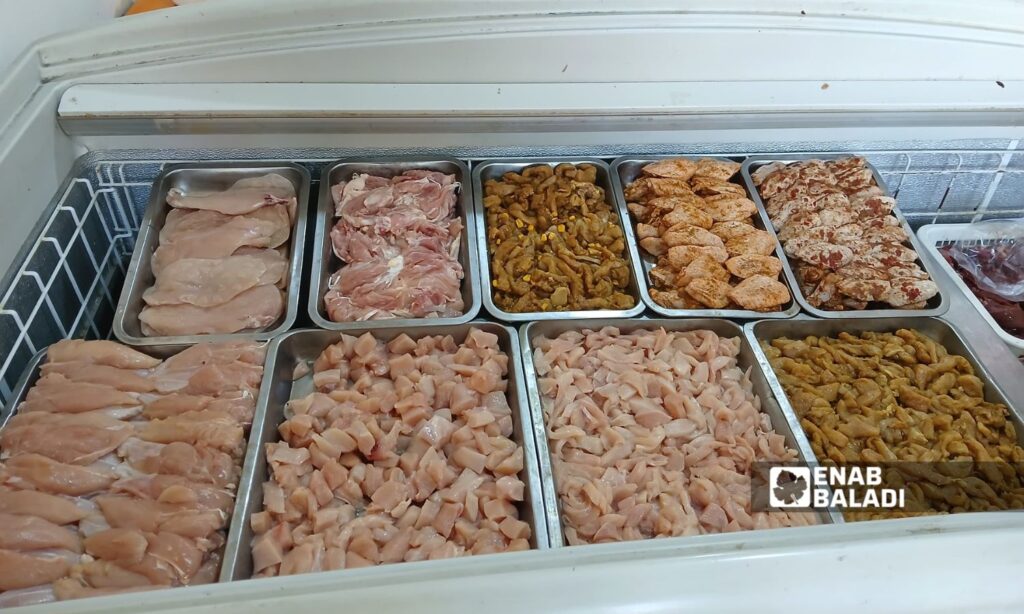Idlib – Samah Alloush
Chicken meat prices have risen by 25% in Idlib, northern Syria, causing many residents to abstain from purchasing it due to prices not aligning with their purchasing power.
Since the end of January, the price of a ton of chicken has reached $2,100 (approximately 20 million Syrian pounds), up from $1,500 per ton.
The price of a kilogram of chicken thigh has reached 23,500 Syrian pounds ($2.50), the boneless skinless breast at 37,000 pounds ($4), and a kilogram of whole chicken is at 28,000 pounds.
The rise in prices has prevented a large segment of the population from buying chicken, especially since it is a primary source of protein compared to red meat prices, which are much higher. For instance, the price for a kilogram of sheep meat has reached 92,000 pounds ($10), and a kilogram of beef is 75,000 pounds ($8).
Diseases and increased demand
Omar Sayid Issa, the manager of al-Yamama Poultry Slaughterhouse in Idlib, told Enab Baladi that the reason for the rise in chicken prices is the spread of diseases that have led to the death of flocks of chickens.
Additionally, the increased demand for chicken from other provinces following the fall of the former Syrian regime and the halting of most poultry farms for a full cycle in regions recently “liberated” due to ongoing battles contributed to the price hike.
He also noted that the price of chicken feed per ton has increased by $20 due to changes in customs duties.
Khaled, a chicken vendor in Idlib city, struggles to secure adequate quantities for sale due to the closure of some poultry farms and supply disruptions, along with traders from other provinces coming to buy chicken because of its relatively lower cost compared to prices in their regions.
He explained that this situation is called “increased demand and decreased supply,” which is also a primary reason behind the rise in prices.
Ramiz, who owns a poultry farm in the Idlib countryside, expects prices to decrease soon, as the rise resulted from market volatility. He believes that once the markets stabilize and feed, chick, and fuel prices standardize across provinces, the situation will improve.
He mentioned that the rise in fuel prices has also significantly impacted overall prices, with diesel currently priced at $1 per liter and gasoline at $1.25.
Calls for boycott
Khaled described the residents’ interest in purchasing chicken as “from moderate to weak,” due to the ongoing economic and living conditions that remain poor, making it difficult for them to cope with any price hikes.
Following the price increases, several social media pages have called on residents to boycott purchasing chicken as a way to pressure traders to lower prices.
Enab Baladi asked several people about their purchasing capabilities, and the responses were similar: they are waiting for a price decrease or planning to buy reduced quantities, or even abstaining entirely, as daily wages have not improved.
Faisal Lababidi, who works for a daily wage that may reach a maximum of five dollars, struggles to afford chicken at these prices, considering that meat has become a dream for low-income families. He believes there is no need for a boycott, as he relies on eggs as a protein source for his family, with the price of a tray of eggs (30 eggs) approximately $2.20, which hasn’t been affected by the rising chicken meat prices.
Ministry of Economy: Periodic surveys of food prices
Regarding the existence of controls or regulatory supervision on poultry farms and shops to align prices with traders’ profits and consumers’ needs, the media office of the Ministry of Economy in the interim government of Damascus stated that the Pricing Directorate is working to establish indicators through periodic surveys of food prices, including chicken.
Concerning price changes, the matter is linked to the balance of supply and demand. The recent increase in price is associated with seasonal factors and animal husbandry issues, which reflect on market supply and demand quantity.
The office added that the government is performing its role through its tools, including the supply department, to prevent commodity hoarding or trader manipulation of prices.
As for future plans to limit price increases in line with Syrians’ purchasing power, the media office stated that increasing competitiveness among merchants and allowing new competitors through investments in all sectors will benefit residents by lowering prices and improving quality available to consumers.
Regarding plans to unify prices across provinces to relieve the pressure on Idlib and its countryside, the office clarified that with the liberation of Syria, each border crossing had different fees and working mechanisms, leading the Ministry of Economy to issue a unified tariff on all Syrian crossings and outlets to standardize prices for imported products and improve local product quality to compete locally and internationally through a new structure and operational mechanisms that contribute to economic development.
On January 20 of the previous year, Médecins Sans Frontières (MSF) reported that more than 70% of the Syrian population needs “urgent” humanitarian assistance and confirmed its efforts to expand its activities in areas that were previously “impossible” to access during the regime of the ousted president Bashar al-Assad.
According to the UN High Commissioner for Refugees, more people in Syria are sliding into extreme poverty, with 16.7 million people in need of humanitarian assistance and protection.











